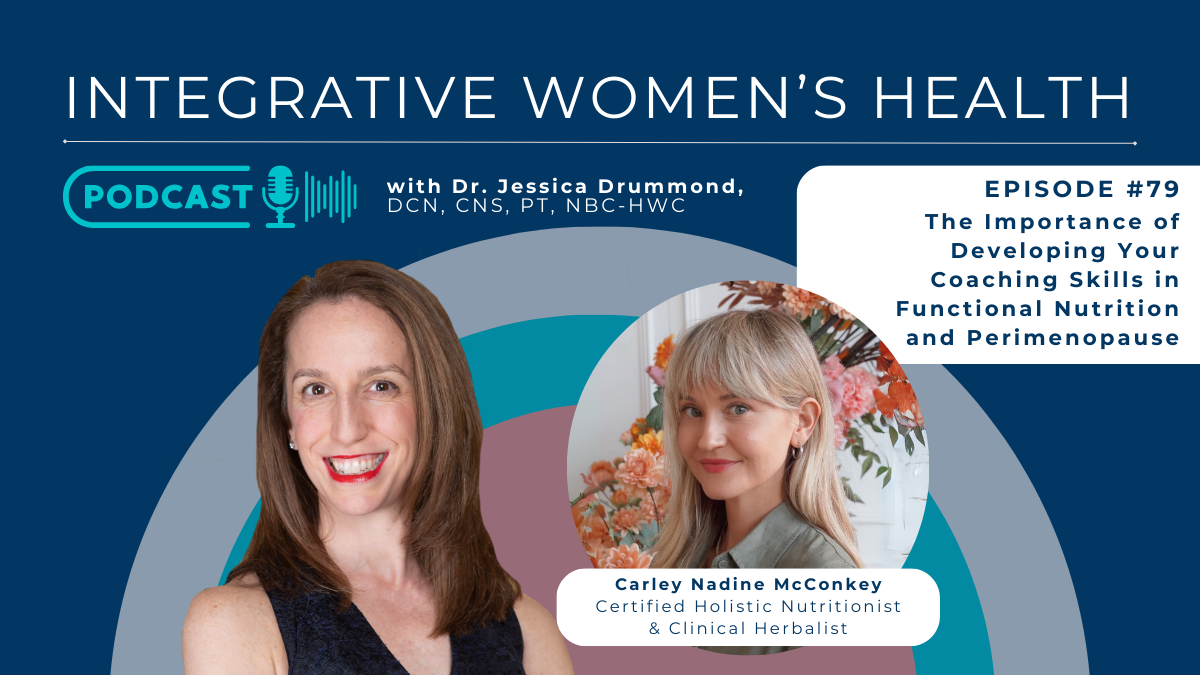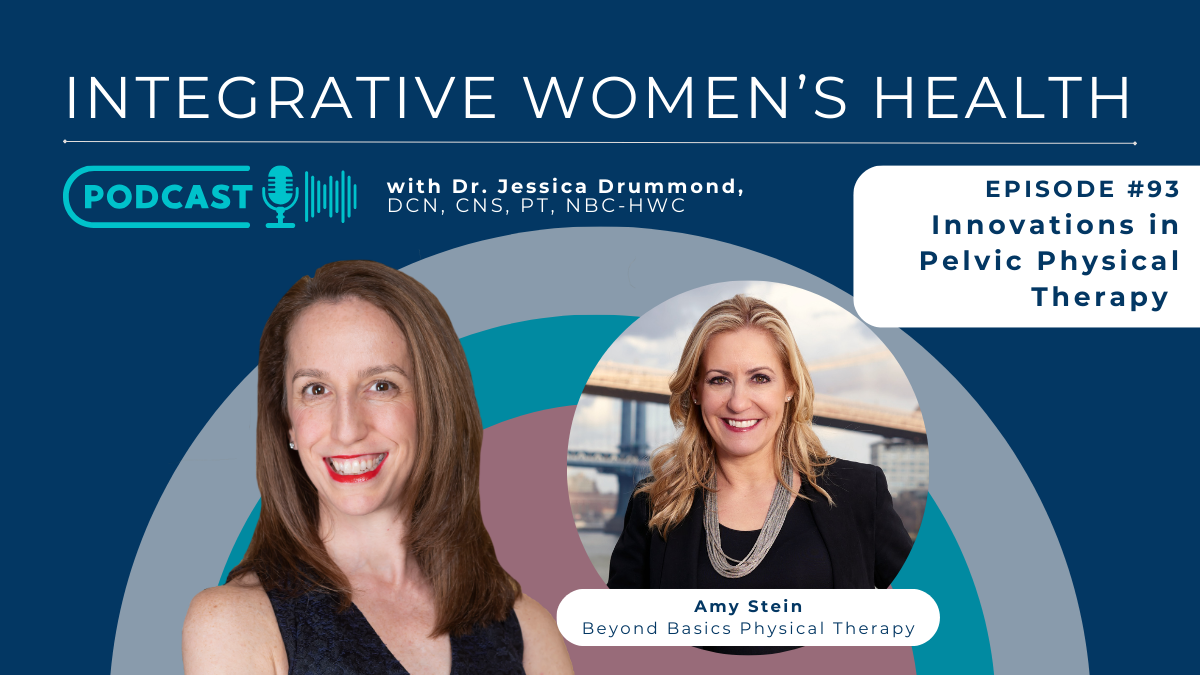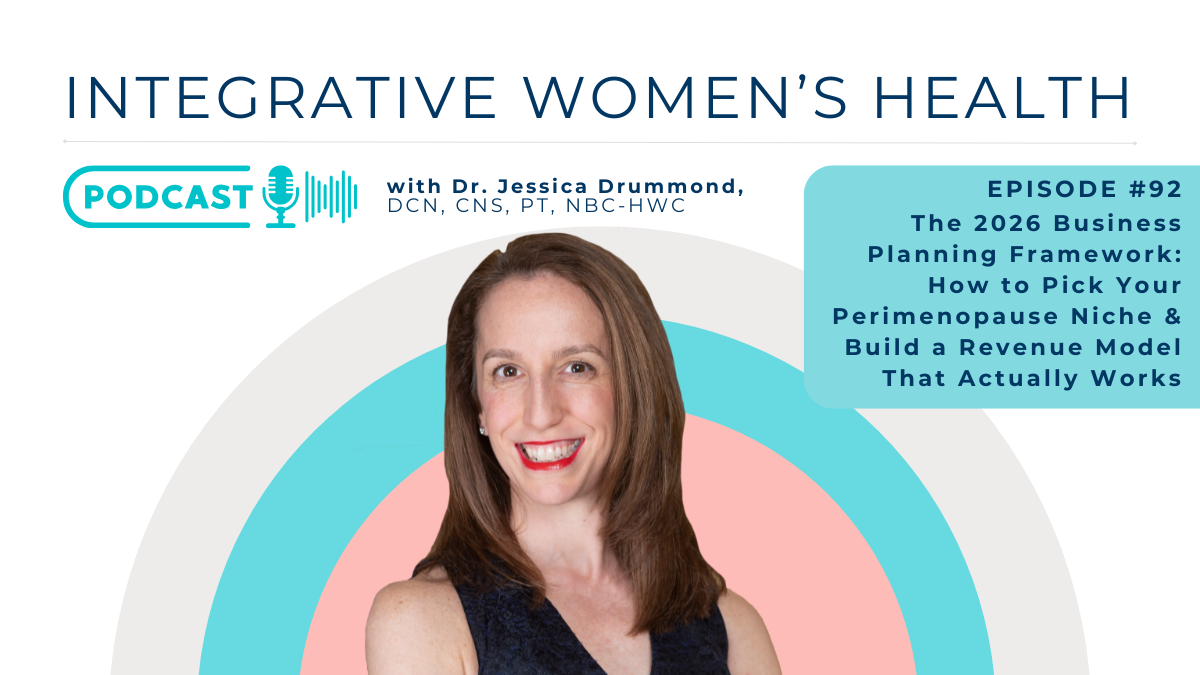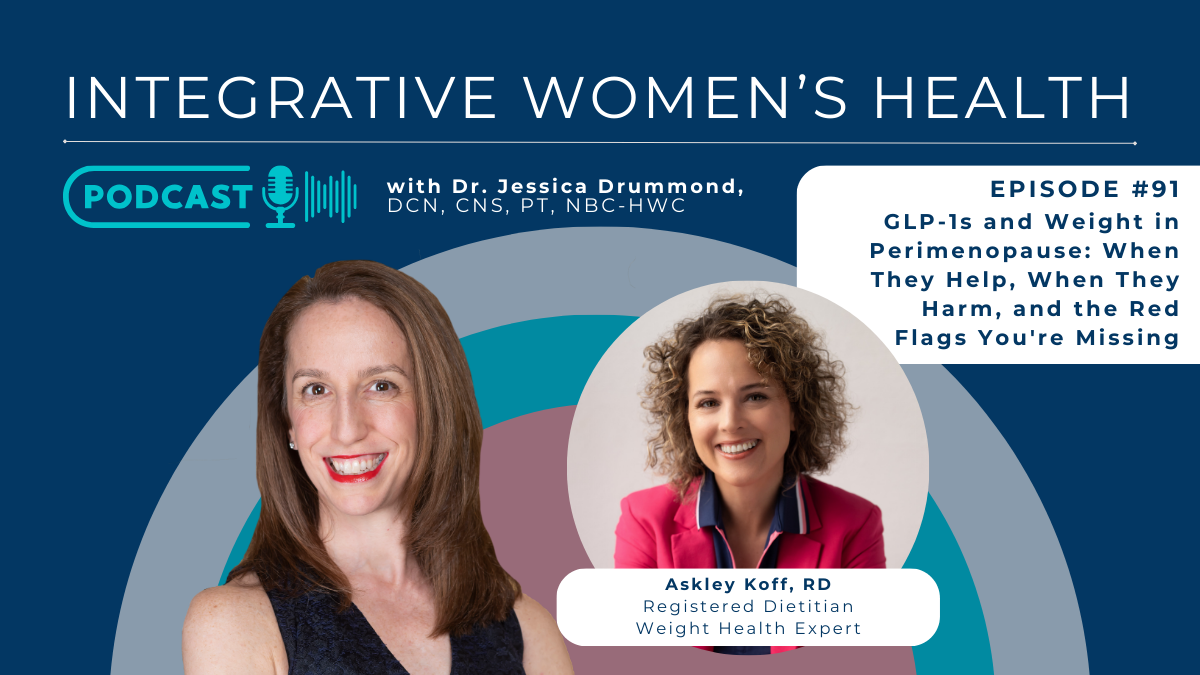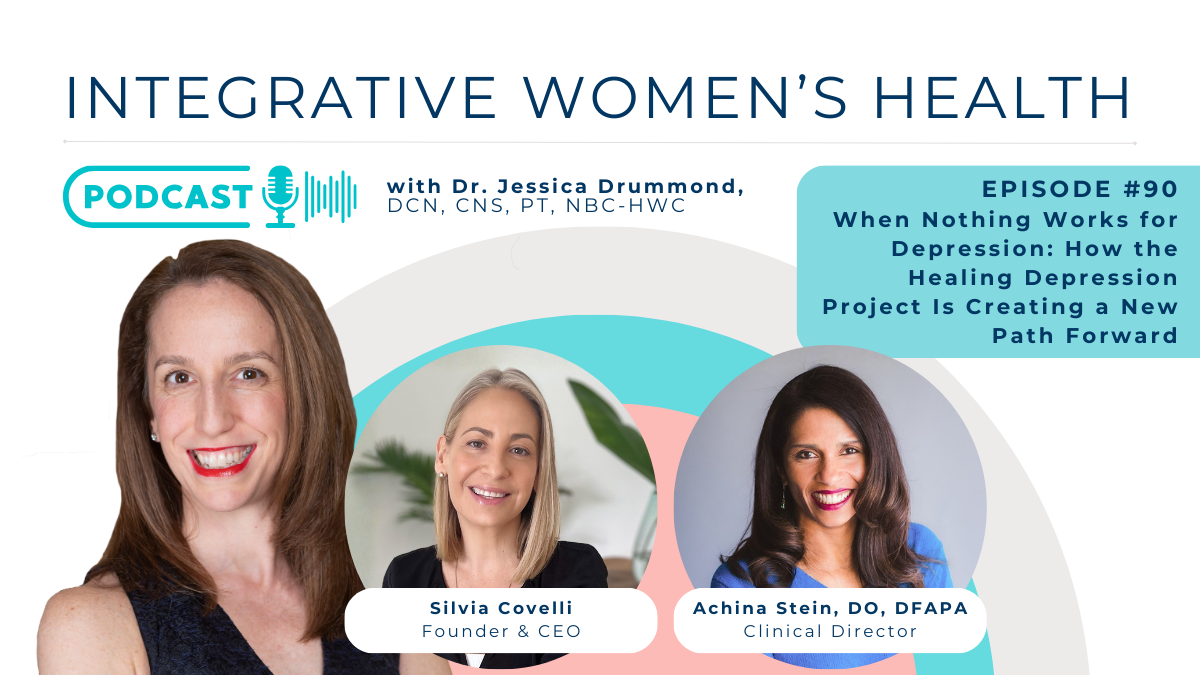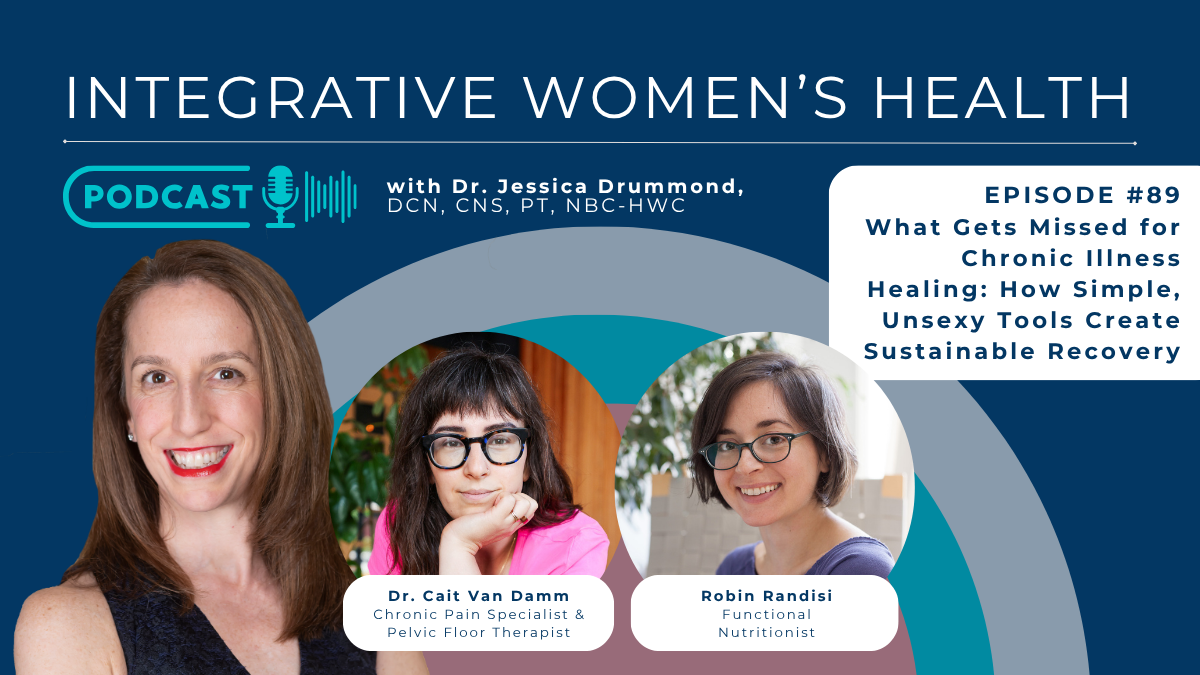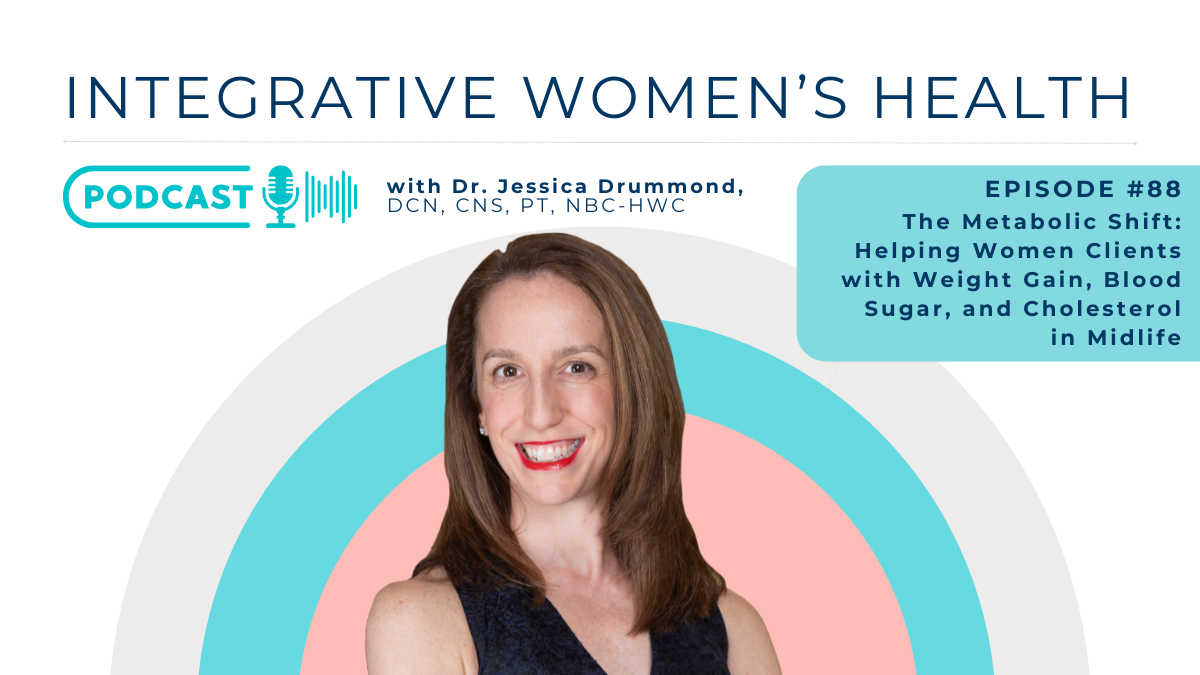Follow Us for Free:
About the episode
“Being a holistic practitioner is about focusing on the individual, not protocols.” – Carly Nadine
So many of our clients come to us carrying complex histories, whether it’s years of period pain, medical gaslighting, trauma, chronic infections, or a sense of not being heard. By the time they reach midlife, we have to adopt a different approach. True healing requires slowing down, holding space, and co-creating solutions that meet each woman where she is.
For practitioners, this is a powerful reminder that we can’t lean solely on labs, supplements, or even functional medicine protocols. We must develop the skills of listening deeply, integrating nervous system regulation, and empowering our clients to take ownership of their healing journey.
Today, I’m joined by Carly Nadine McConkey, certified holistic nutritionist, clinical herbalist, and graduate of our Perimenopause and Menopause Certificate Program. Carly shares her journey from being placed on birth control before her first period to becoming a trauma-informed practitioner who blends functional nutrition, herbal medicine, and coaching.
In this episode, Carly and I discuss her growth mindset, how she overcame imposter syndrome, the value of group coaching support, why integrative practitioners must be comfortable with both evidence and the unknowns, why we must develop our coaching skills for our clients in perimenopause, our role in educating clients on their treatment options, and more.
Enjoy the episode, and let’s innovate and integrate together!
About Carley Nadine
Carley Nadine McConkey is a Certified Holistic Nutritionist and Clinical Herbalist specializing in women’s health and perimenopause. She blends functional nutrition, herbal medicine, nervous system work, and targeted functional testing within a trauma-informed approach to address root causes. With advanced training from the Women’s Health Coaching program at IIN, a Women’s Hormone Health Certification with Nicole Jardim, and certification from the Integrative Women’s Health Institute, Carley draws on both her professional expertise and lived experience to help women feel seen, heard, and empowered to thrive during this season of life and beyond.
Highlights
- How Carly’s personal health struggles and growth mindset shaped her coaching journey
- What led her to specialize in perimenopause and menopause
- The certifications and trauma-informed approach Carly brings to coaching
- Why empowering women with nutrition, herbal medicine, and holistic tools makes such a difference
- Managing client expectations as a coach
- Why trauma-informed care and creating a sense of safety are critical
- Unlearning the “fix it” mentality
- The discomfort and benefits of live group coaching
- Why true empowerment goes deeper than simply handing out protocols
- Key lessons Carly learned about hormone replacement therapy, histamine, and long COVID
- How chronic illness overlaps with perimenopause
- Why continuous learning and a growth mindset are essential for evolving as a practitioner
Connect with Carley Nadine
Mentioned in this episode
Ready to revolutionize your career and grow your practice?
- The Integrative Women’s Health Membership
- What is the next step in your career in women’s health and wellness? Start here: https://integrativewomenshealthinstitute.com/start-here/
- Integrative Women’s Health Institute on Instagram | @integrativewomenshealth
- Integrative Women’s Health Institute on YouTube
Learn more about The Integrative Women’s Health Institute’s Programs.
Click here for a full transcript of the episode.
Dr. Jessica Drummond 00:00:03 Hi and welcome to the Integrative Women’s Health Podcast. I’m your host, Doctor Jessica Drummond, and I am so thrilled to have you here. As we dive into today’s episode, as always innovating and integrating in the world of women’s health. And just as a reminder, the content in this podcast episode is no substitute for medical advice, diagnosis, or treatment from your medical or licensed health care team. While myself and many of my guests are licensed healthcare professionals, we are not your licensed healthcare professionals, so you want to get advice on your unique circumstances. Diagnostic recommendations treatment recommendations from your home medical team. Enjoy the episode. Let’s innovate and integrate together. Hi everyone, and welcome back to the Integrative Women’s Health Podcast. I’m your host, Doctor Jessica Drummond, and I’m so excited to have with us today Carley McConkey or Carley Nadine is the name of her practice and you can find her on Instagram. She is one of our perimenopause and menopause certificate graduates. She is a certified holistic nutritionist and clinical herbalist specializing in women’s health and perimenopause.
Dr. Jessica Drummond 00:01:29 She blends functional nutrition, herbal medicine, nervous system work and targeted functional testing within a trauma informed approach to addressing root causes. She draws on both her professional expertise and she has a very strong growth mindset. As you’ll hear in this interview, she’s done a lot of training. She’s really looked at many things from many different angles, and I really love that about her. She’s very thoughtful and she has a depth of lived experience with chronic women’s health issues, starting from even before she had her period. You’re going to want to hear this story. She helps women feel seen, heard, and empowered and actually be empowered. We’re going to talk about exactly how she does this and thrive during this season of life and perimenopause and menopause and beyond, and I can’t wait for you to meet her, because I think you’ll learn why. If you are a practitioner or a coach, and you especially want to work with women in the perimenopause to menopause transition, you have to really slow down and deepen your coaching skills and coaching practice, which we do every single week in our program.
Dr. Jessica Drummond 00:02:43 And I think the thing that’s most meaningful about how Carley approaches this is she really pushes herself. When those feelings of imposter syndrome bubble up, She slows down, she shows up. She goes back to practicing her skill set. She gets feedback. She comes to the live call. She listens to the other people on the call and learn from them. She has a diverse experience of learning and that she’s taking clinical pearls from experts throughout her career, and she’s really applied them in a way that helps women actually get to the root causes of their challenges without relying only on protocols. Now, she absolutely is highly skilled in functional nutrition and herbalism, and we talk about some of the things that she specifically learned from our program. But I think what you’ll see from her is her own deep commitment to developing and practicing and implementing and growing her coaching skills has really made her one of the leading experts in this. Anyone in her presence will be able to feel the nervous system regulation that work and practice that she’s put in to her own experience.
Dr. Jessica Drummond 00:04:02 That is how she’s able to do it so well for other women. So listen in, think about during this interview. First of all, just listen to this story. It’s absolutely wonderful. But think about during this interview where you have an area, an edge, where you’re sometimes a little uncomfortable in your practice that you know, you could grow there, that you could be even in better service of your clients. And think about how we could support you based on what you hear from this conversation. When we have those growth edges, there’s such an opportunity. I’ll see you on the other side.
Dr. Jessica Drummond 00:04:45 Hi, and welcome back to the Integrative Women’s Health Podcast. I’m so excited to be here today with Carley McConkey.
Dr. Jessica Drummond 00:04:52 Of Carley Nadine that is her practice name. She is a herbalist who joined our perimenopause and menopause program to begin to really specialize in that population, because there is such a massive need. So welcome Carley. What got you excited about the work that you’re doing now and inspired this transition?
Carley Nadine McConkey 00:05:20 Thank you so much for having me.
Carley Nadine McConkey 00:05:22 So I would say that my story would be that I’ve always been passionate about women’s health. And mostly I would say because of my own struggles, like a lot of practitioners can start off by saying, and it started when I was young, I would say I was put on birth control at a very young age. So before my first period, and that happened to treat primary amenorrhea. And for those of your listeners that don’t know what that is, it’s when you don’t get your period by the time you’re 15 or 16. And so I was diagnosed with that. And so I was on birth control before I even got a period until I was in my 30s. So I didn’t actually have a full cycle until then. And then, yeah, I was very much dismissed from doctors. In my early years, I had incredibly painful sex, which was very traumatic in and of itself. Chronic yeast infections, disordered eating, like all of those kind of things. So a lot of unprocessed trauma, so to speak.
Carley Nadine McConkey 00:06:15 And I didn’t really even learn until about the four phases of a cycle until I was in my 30s, which looking back now is so wild, you know, was before the internet and before all this amazing information was widely available. I definitely didn’t know any of that. So I just thought it was the bleed and that was it. And then I would say that it really did push me to learn more about women’s health, nutrition, herbal medicine, not just to support myself and empower myself because I really wasn’t getting the answers that I needed. I had a deep passion to help other women feel seen and heard and empowered to be able to make educated decisions and empowered around their health. So I then became a certified holistic nutritionist and then a clinical herbalist, which I just got registered last year, which was really exciting. And then I got a bunch of certifications with coaching because I recognized how important holding space was. And so from a trauma informed place. So educating with that. And then I also got a women’s health coaching certificate from Ayan.
Carley Nadine McConkey 00:07:21 I studied with Nicole Jardin and then entered your amazing realm of the Integrative Women’s Health Institute. Once I really recognized that I wanted to specialize in perimenopause, to help women with clarity, confidence and have a trauma informed approach that doesn’t necessarily have to be just natural or just allopathic. I really want to educate and empower women to make an informed decision. That can be either. So that’s kind of where I’m at.
Dr. Jessica Drummond 00:07:51 What I’ve really tried to do with this program is bring together the fact that we have all of these tools, we have nutrition tools, we have supplement and herbal medicine tools, we have exercise, sleep, mindfulness, nervous system regulation, hormones, peptides. I say this all the time, but I’m so excited that we’re sort of the first generation of adult midlife women and adult older women beyond 60 who can really make our own decisions fully.
Carley Nadine McConkey 00:08:25 Absolutely.
Dr. Jessica Drummond 00:08:26 And so I want to empower women with all of those tools. So if you think about your clients, what are some of their goals? What are they excited about and where do they tend to feel stuck when they come to see you?
Carley Nadine McConkey 00:08:39 Great question.
Carley Nadine McConkey 00:08:40 So I would say that there now is I feel like there’s a shift where women are really recognizing that they do have more power over their health than they ever thought possible, I think. I mean, I can’t speak to generations before, but it was very much like you saw your doctor and they knew everything. And I think now with all this information and, you know, things like bioidentical hormone replacement therapy, there are so many things now to empower women. So women are coming to me really curious about ways that they can support themselves. I do have a lot of women that are very proficient with health, so to speak. I guess maybe almost too much information, and then some women that aren’t as much so excited that they can support themselves and very motivated. With that being said, I do find that a lot of because of the society that we live in the world we do live in very much like a pill for every ill sort of mindset. I think a lot of women want results immediately.
Carley Nadine McConkey 00:09:39 I’m guilty of it as well. So I would say that really just being clear about expectations and really honing in on that empowerment part, that they do have control. However, it’s not going to be something that’s overnight. It’s not just going to be a quick fix, a quick pill that comes with herbal medicine, that comes with nutrition and that comes with lifestyle and nervous system support. Most importantly.
Dr. Jessica Drummond 00:10:03 So true. And I think who doesn’t want the quick fix. Like everyone wants to just solve their problem faster with a very simple solution. And I do think this is why hormone replacement therapy, now that we have the data, that it’s safe and effective, is a very valuable tool. That’s why some of the peptides are valuable tools. That’s why some of the supplements and herbs are valuable tools, is that they can kind of give you a little bit of a quicker return in certain parts of the struggle. But as you said, it’s not going to solve the whole problem. So it sounds like what you’re really offering because of this coaching model that we frame, everything within is the space for women because it’s like a quick fix to what? So first we have to determine the goal.
Dr. Jessica Drummond 00:10:53 So if you think about your clients and your practice, when they really slow down and take a moment to get excited about their goals, how do they feel like, what does that look like?
Carley Nadine McConkey 00:11:05 Yeah, I would say some are really motivated and it really does depend on an individual. Everyone is so unique. I could have two women on paper that look identical in terms of their symptoms, in terms of, you know, their diagnosis, what have you. And then when I actually sit with them in a coaching setting where it’s one on one holding space, it couldn’t be more different. And so I think that that’s something I’ve learned and something that I think is pulling away from that. You know, sometimes that functional medicine model, which can be quite allopathic, where it’s like, let’s give someone a protocol based on their symptoms and their diagnosis. But being a holistic practitioner and I will die on this hill is all holistic, is very much based on the individual, which I think being in that coaching session with someone really does allow that.
Carley Nadine McConkey 00:11:53 So yeah, I would say that everybody is completely different. And that also goes with how I work with a client as well. So some clients might be more open to working with certain herbs, which very much have very strong energetics properties to them. Whereas some folks might be more inclined to want to do more nervous system work, and they don’t really want to take herbs or supplements. And so we’re going to work on little things that they can do every day. That’s going to help them feel better. So yeah, I would say that everybody is really, really different in terms of what their goals are. And I don’t really find that out until we’re sitting together. Some can be very resistant and then others can be so on board and they get results right away. So.
Dr. Jessica Drummond 00:12:37 Well, and I think you mentioned that here at Iwe, we care a lot about that sort of trauma informed lens because so many women have a similar story to yours, right? They have a history of kind of lifelong period pain, endometriosis, period issues, pelvic pain, painful sex trauma, medical trauma, not being believed, gaslit that by the time they come to you and your practice, having that skillful way of holding space so that we’re helping their nervous system know that they’re just safe, even in your presence, makes such a huge difference.
Dr. Jessica Drummond 00:13:16 I think that’s the thing I’m most excited about for all of our graduates, because you are such a rare practitioner in the medical system, because the vast majority of people in the system, even if they want to practice in this way, they can’t. They have such limited amount of time, and by the time women come to see us. They’ve been to their gynecologist. They may have been referred to specialists, but each of those people has only seen them for 5 to 10 minutes. So you’ve been using a trauma informed coaching model for a while. If you think about any moments or stories where you really felt like, this is why I do this. Does anything come to mind?
Carley Nadine McConkey 00:14:01 Yeah, absolutely. So there’s a few cases, but one in particular was someone that I worked with and in the past, and I’ve shared this with you before in one of our sessions where if someone wasn’t getting results, I would really put it on myself. I would very much make it about myself. Where I’ve failed this person.
Carley Nadine McConkey 00:14:20 I get really upset and discouraged. And I mean, that is definitely something that I worked on and have shifted so much by working on nervous system support for my myself and to be able to actually hold space for my clients. But once we’re in particular, Was this one woman that I worked with and she was my ideal client. When I think of an ideal client. It is this woman. She was just really receptive to a lot of the nervous system work, and she’d taken all the supplements, done all the things, and I really used this as a opportunity for me to really coach and hold space for somebody. And so we did, and she shared a lot with me. I held space, I didn’t try to fix this person, and we really put into place some things that she could do. She was a teacher. She was coming home, really dealt with a lot of anxiety. And I did see as a mirror quite a few things in my past self in her. And we implemented some nervous system work.
Carley Nadine McConkey 00:15:21 And I remember this point where we had a session and she was like, oh my gosh, you’re going to be so proud of me. I came home, I was so anxious and I was a wreck, and I thought, I heard your voice in my head. I said, okay, stop. Just go and take ten minutes and sit down and just like, breathe. And so she started doing that. She started going into her room and before she got activated, or perhaps, you know, disassociated by, like, turning on the TV or scrolling or what have you of humans and how we disassociate. yeah. She started implementing things, these things and actually doing it. And I was so impressed. And she felt like it truly changed her the way that she was dealing with things and the way that she could show up in her household as a teacher. And yeah, it was really amazing to see that. And so that’s kind of a long answer. But I would say once I started really implementing the actual coaching and just holding space, and instead of just trying to throw solutions at my clients of like, do this, do this, do this, here’s another herb, here’s another adaptogens.
Carley Nadine McConkey 00:16:28 Instead, I just stopped and was like held Hold space, listen to my client, and actually implemented things together. We did a co-creation of being able to create something that worked for her, and that would actually reduce his anxiety. And it really worked. And I remember our final call, she sent me this really lovely message that just said, in short, like, you changed my life, which I think is a little extra. I remember feeling like, oh my gosh, I’m imposter. Like, this isn’t true at all, but it was such a lovely message that she sent me. And I think at that moment I really did feel aligned with, yes, this is the work I want to do. it’s not sexy all the time. It’s it can be very uncomfortable and it can be very challenging holding space as a practitioner for people. And, you know, I went to school for nutrition and herbalism, and I didn’t think that I would be coaching or holding space. And that’s exactly what I’m doing.
Carley Nadine McConkey 00:17:23 And that’s what people need.
Dr. Jessica Drummond 00:17:26 It’s so true. You know, my original clinical training is in physical therapy. And then I got a doctor at nutrition, and most of our students have some kind of license or certification. There are nurses, their Pts, OTS, Pas, physicians, nutritionist, mental health professionals, acupuncturists. So they have like this clinical skill set and are clinical or like fitness coaching skill set is all about telling people what to do. And you’re also kind of trained in your program or graduate program, as you said, like it’s your job to quote unquote, fix them. So one of the things that I’m always helping people to unlearn is that mindset. But there’s that moment that you kind of alluded to where it’s a little scary for you. And I certainly went through this, too, as I evolved my practice, like almost 20 years ago now, where you really have to be patient with the person slowing down. Opening it up. Trusting you enough. Letting them try and fail and learn from their experiences.
Dr. Jessica Drummond 00:18:38 And not just piling them on with more stuff to do and letting them feel. As you said, that discomfort of like, okay, I want to grab my phone or I want to grab a donut, or I want to grab a glass of alcohol, or I want to start yelling at my family, whatever it is that we use to kind of calm the nervous system in the moment. They have to notice that sensation and then make a decision. Have a little space. And so in that messy part, you said it’s not always sexy. You yourself have really had to grow. And one of the things I’ve really seen in our work together, I’d love for you to talk about, like, do you like that part of our program where we show up live every week and you’re like, okay, this is uncomfortable. you know. Tell me a little bit about what that experience is for you, because I’m sure it’s hard to come to those live calls where I’m coaching you on how to be more uncomfortable.
Carley Nadine McConkey 00:19:37 Yeah. Great question. And so it’s interesting, actually, when I signed up, I went in with the mindset that I need to learn more. I need to learn everything there is to know about perimenopause and everything there is to know about hormone replacement therapy and all the education sort of thing. So I kind of overlooked that part of it. And I’ll say that being in the program, this is the thing that I’ve been finding I’ve enjoyed the most. I mean, I love the program, but the coaching and the accountability, and I’ve shown up for almost all the calls. And like you said, it is uncomfortable sometimes. You know, you have in a very, of course, calm and great way, but you’re really good at holding up mirrors and asking questions And really helping us hold space, and it can be very uncomfortable. And there’s been many times where we’ve gone off calls where either I’ve shared or I’ve just listened in on other practitioners experiences, which is so valuable in and of itself, which is something we overlook.
Carley Nadine McConkey 00:20:39 And I often think about it afterwards. I allow it to like process and it comes up afterwards. It was unexpected. So it can be uncomfortable, but I’ll say that I leave the calls feeling pretty motivated, actually, and it just really does hit home how important the coaching aspect is.
Dr. Jessica Drummond 00:20:59 Yeah, well, there is so much to sort of unlearn from our other trainings. But then I think what’s so lucky is in those groups, I mean, we’ve been working with people who’ve been in our community since 2006. So the other people on the call, as you said, it’s a group coaching call. It’s such a safe space for all of us to grow. And that’s very often the leading edge. It’s like, oh, how do we hold space for people who are like, you know, are they going to be mad at me or are they going to blame me? And they won’t? When you really get skilled at this and having that safe space to practice because everyone on the call is always like, so supportive and so helpful and we learn from each other.
Carley Nadine McConkey 00:21:43 Yeah, I agree. And one thing I’ll add as well is, you know, I’ve been in courses, I’ve been on live calls within courses which help answer questions, but I think the coaching in particular is really, really valuable. And where this is kind of different than anything else I’ve experienced, I can come to a call where I have an issue not with a complex case, but maybe something very specific to coaching it. Maybe personally, something is coming up for me. Like I mentioned before, how maybe sometimes I can be really hard on myself that I’m as a practitioner, I don’t know enough or I failed them, or maybe very specifically like not knowing how to answer a specific coaching question and or what coaching questions should I ask? So that is very valuable as well. Being able to actually ask you very specific questions. And in the group of how to support this particular client or something that might be coming up for me. So yeah, it’s pretty helpful.
Dr. Jessica Drummond 00:22:38 That’s great to hear. Really.
Dr. Jessica Drummond 00:22:40 So you did mention that we worked through the hard part of coaching, but which I actually think once we get good at it makes our job so much easier because you’re not constantly trying to fix people. Like they really do start doing exactly what your client said. Like, you’ve changed my life. I now know how to do this for myself, that that’s a depth of empowerment that’s really different from being like, let me look at your functional labs and give you a protocol. And again, it’s not to say that that’s not valuable to help along the process, but the process is really what we were just talking about. So there is however Education and.
Carley Nadine McConkey 00:23:20 Which is so important.
Dr. Jessica Drummond 00:23:21 Perimenopause and menopause. And the nutrition and lifestyle. And. HRT and all of the cool stuff. Is there anything that stands out in the education that you were excited about, surprised by? What can you say about that?
Carley Nadine McConkey 00:23:36 Yeah. So I would say that I think the thing that stood out the most for me, I have a wealth of knowledge when it comes to herbal medicine, supplements, functional medicine, testing, nutrition.
Carley Nadine McConkey 00:23:48 And I liked doing that part as well because it’s always really lovely to see, like from someone else who is very educated in that world, to also solidify things that I already know, but add little clinical pearls as well. Moving on to topics that I already know about, which I love. But what I really loved was the very in-depth knowledge around bioidentical hormone replacement therapy and hormone replacement therapy in general. I would say for me that was like exceeded my expectations from all the information that you had and you presented, but all of the voices that you hosted as well. So for those of you that don’t know, there is, I think over like ten interviews with everyone from nutrition professionals to doctors that are like ahead in their fields. Male, female and everyone in between giving information and their opinions, professional and personal. On bioidentical hormone replacement therapy and hormone replacement therapy as well. So I found that really exceeded my expectations. And after finishing the program, I feel so much more equipped to be able to answer questions and really be able to empower my clients.
Carley Nadine McConkey 00:25:00 Like, I don’t have a license, so I will not be prescribing anything. However, being able to empower my clients of what they can look for, who they can talk to, what the differences are, and all of those kind of things, and having those scientific backed studies and voices from people that are really well respected in their field. So that and then another thing that I found to be incredibly insightful and I, which I loved, was talking a lot about histamine reactions and long Covid and its relation to perimenopause, fluctuating hormones, just a lot of like, again, clinical pearls in which I never really connected the dots before. And there was some things that you didn’t necessarily go like super in-depth with or, you know, give us these very specific protocols. But I’m a very curious person and I love research and I love that. So I found that it was a great entryway to pique my curiosity and make that connection, which I never had before. And I’m like, oh my God.
Carley Nadine McConkey 00:26:00 Like, moment. And so now, yeah, I’ve been doing a ton of research and it’s really opened another a whole new world for me in that respect. So yeah, I’m sure there’s many other things, but off the top of my head, those of them.
Dr. Jessica Drummond 00:26:13 Well, I and get excited because I’m working on the protocols now, which you will get very soon, very soon. There is that little bit of a missing piece in a lot of perimenopause education around overlap between perimenopause, menopause and chronic illness. So many people have mast cell activation syndrome or other histamine issues, pots, dysautonomia, endometriosis, period pain, painful sex like that pre-dated the perimenopause. Like it wasn’t just perimenopause or perimenopause. Flared it or it happened at the same time as perimenopause. I think that’s a huge hole in what any other perimenopause and menopause education offers. So we’re going to go even deeper with that. So I’ll share that with you after this conversation.
Carley Nadine McConkey 00:27:00 Very excited.
Dr. Jessica Drummond 00:27:01 Yeah. And one of the things about why I invited so many prescribing professionals to talk about the research around hormone therapies and bioidentical hormone therapies, and how they are similar.
Dr. Jessica Drummond 00:27:16 How they’re different is because, you know, I do think if you’re going to be a specialist in any area, you’re going to be at the perimenopause menopause expert in your area, in your community. You should learn it from multiple people who are actually practicing. Absolutely, you know, who have worked with hundreds to thousands of cases. And we all really do have clinical pearls and clinical wisdom to share. I mean, the three legged stool of evidence based medicine is peer reviewed literature, clinical practice experience and that individual client or patient’s experience. So I’m glad that that was really insightful for you, because I think that sometimes when people are choosing where and how to do training, they don’t think that actually you should maybe do multiple training. So even if you’ve already done someone else’s coaching training, or someone else’s nutrition training, or someone else’s. Even perimenopause training. You’re going to learn a lot here because we see things through a different lens.
Carley Nadine McConkey 00:28:23 Absolutely. And I think that in whatever area you’re in, in the health world, whether that be, you know, a nutritionist, herbalist, physiotherapist, doctor, naturopath, I think that it’s important to constantly be learning and unlearning, if you will, because things change all the time.
Carley Nadine McConkey 00:28:40 New research comes out, my mind has changed, and the way that I perceive and how I work with clients has shifted so much over the ten years that I’ve been in this world and in the health world. And yeah, I think it’s really, really important to learn from different voices, learn from different people, nervous system, energetics, even traditional and allopathic. So yeah, I think it’s really, really important.
Dr. Jessica Drummond 00:29:05 And I think what you just said about you being flexible and open to that. Evolution is the sign of a really skilled expert, a really skilled coach clinician, because it’s people who stay kind of rigidly inflexible with beliefs rather than evolving wisdom or evolving research. Science evolving, experience evolving, just better listening to their clients. They stay stuck where the growth mindset I think is really, really important. So thank you so much for sharing all of that. If someone wants to reach out and get your really skillful, mindful listening and holding space in their case, because you really are such a strong clinician and coach, because I really think you have developed and practice those skills in particular, and you keep learning and you keep challenging yourself.
Dr. Jessica Drummond 00:30:03 So if someone wants that honor to be in your presence and work with you. How would they find you?
Carley Nadine McConkey 00:30:10 Yeah. So you can find me on Instagram at Carlini. Dean underscore I have so many recipes and herbal tips and so many things on there. And in October, I’m actually going to be launching my program and my in-depth clinical practice of working with me one on one. And it’s going to be very much dedicated to serving women in perimenopause. So 35 to 55, if you will, in that transition and season of their life. So yeah, October will be when I’m launching that. And if you want to work with me one on one, otherwise feel free to reach out to me on Instagram. And I love to connect.
Dr. Jessica Drummond 00:30:48 Excellent. Well, thank you so much for sharing with us today, Carley. Thank you for your work and your dedication and your constant growth mindset and just your wonderful presence on our group calls. We love having you in our community, and I encourage everyone to reach out and follow Carley and learn from her and be in her presence.
Dr. Jessica Drummond 00:31:06 There’s something really magical about that. So thank you so much.
Carley Nadine McConkey 00:31:09 Thanks, Jessica.
Dr. Jessica Drummond 00:31:14 I hope you enjoyed meeting Carley and hearing her story and hearing how she’s really evolved her practice over the last decade to work with women in the perimenopause to menopause transition, and why and why that’s so important to her. Write down one thing this week that you were inspired by in her story. How is your growth mindset? Is there some area that some little leading edge or challenging edge that you would like to grow more into? We are absolutely here to support you in that. We’re here to help you completely understand with amazing confidence everything from nutrition, lifestyle, medicine, supplementation, protocols, testing, HRT. I want you to feel so confident that you can help your clients get all their questions answered. Build their perfect team. And even more importantly, how comfortable are you with holding space with asking those powerful questions, with just confidently sharing what you know and being comfortable in the areas where there are unknowns? There are still plenty of research holes here.
Dr. Jessica Drummond 00:32:26 Are you comfortable with evolving your beliefs over time and evolving your understanding over time? So your one little bit of homework this week from today’s episode is write down one area in which you would like to develop yourself over the next quarter. What would you like to learn explore? Could you show up more for yourself? Are there things you could practice or explore? And if it’s in the area of perimenopause or menopause? We’re absolutely here to support you, particularly in those complicated cases for women that Carley and I talked about who maybe are not just dealing with the transition and transformation of perimenopause and menopause, but have chronic fatigue issues, chronic pain, pelvic health issues, chronic migraines, chronic concussions, you know, mix disorder, anomia, hypermobility syndromes. We’re the specialists for what we used to call zebras in our clinical training, those sort of rare cases. But if you look around, I don’t think it’s that rare for the women in your practice to have histamine issues MCAS, neurodivergent hypermobility, chronic pain, chronic fatigue conditions, headaches.
Dr. Jessica Drummond 00:33:43 This is common, common, common stuff. And so we cannot be looking at perimenopause and menopause in a vacuum where the place if you want to feel confident, no matter who shows up to work with you and where they’re struggling. We’re here to hold you. When you’re at, you’re a leading edge. Because I want you to be the best practitioner you can be. The women in your community deserve that, and you’re ready to give it to them. So where’s your leading edge this week? What area of your practice could you improve just a little bit. We’re here to support you. Have a wonderful week. I’ll see you next week.
Dr. Jessica Drummond 00:34:27 Thank you so much for joining me today for this episode of the Integrative Women’s Health Podcast. Please share this episode with a colleague and if you loved it, hit that subscribe or follow button on your favorite podcast streaming service so that we can do even more to make this podcast better for you and your clients. Let’s innovate and integrate in the world of women’s health.
Join Dr. Jessica Drummond to learn the three key steps to becoming a successful, board-certified Women’s Health Coach who leaves a lasting positive impact on their clients.
Learn how utilizing health coaching skills in your practice is crucial to your success, leaving a lasting impact on your clients, and shifting the paradigm of women’s healthcare.

Dr. Jessica Drummond
Founder & CEO
The Integrative Women’s Health Institute
At the Integrative Women’s Health Institute, we’ve dedicated 17 years to crafting evidence-driven, cutting-edge programs that empower practitioners like you to address the complexities of women’s health.
Dr. Jessica Drummond’s unique approach focuses on functional nutrition, lifestyle medicine, movement therapies, nervous system dysregulation, trauma, and mindset – essential elements often overlooked in traditional health education.
In addition, your training will be fully evidence based, personalized, and nuanced (this is not a cookie cutter approach) in functional nutrition, exercise, recovery, cellular health, and all other lifestyle medicine tools.
You’ll learn to support your clients with cutting edge tools safely and effectively.

